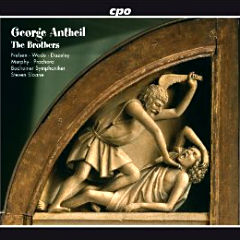I received a package in the mail this afternoon from La Cieca, and eagerly tore it open. I knew that this was to be my parterre review assignment… rapture! It was a CD
of an opera: The Brothers composed by… George Antheil? Who the fuck is that? After researching him for a bit, I got the feeling I wasn’t the only one who skipped over George Antheil in music education.
Apparently, for the majority of his career, he was a somewhat spoiled artist bankrolled by the patroness Mary Louise Curtis Bok—that’s “Curtis” as in “Curtis Institute of Music.” Seemingly he gallivanted around Europe during the early 1900s until her money was cut off, whereupon he moved to LA and began composing film scores out of financial necessity.
This is relevant because this opera seems to be highly influenced by Antheil’s time working for the film studios. The plot, a 1950s updating of the Biblical tale of Cain and Abel, tells the story of a dysfunctional household of three people: the brothers, KEN and ABE (get it? wink, wink!), and Abe’s wife Mary. Ken and Abe love the same girl, but live together… a bad combination, especially since Ken is a mentally-unstable traitorous WW2 vet that betrayed his comrades to the Nazis.
There are all sorts of heavy-handed biblical references, and the plot spools out just as you would expect it to. However, Antheil’s music does keep the tension consistently high, much like a Hitchcock film. Indeed, the piece’s chief virtue, most probably gleaned from the 20 or so blockbuster film scores that Antheil had already composed, is its theatricality and stage worthiness. This is an opera that has a story to tell, and begs to be staged. I think that, in our sad world of the “university trained composer”, this is a trait all-too often lost in new opera.
Musically, the work seems to owe a debt of inspiration to Bernstein’s Trouble in Tahiti, as it is similarly a gritty and verismo-like setting of a deeply dysfunctional family (think Il Tabarro set in post-war New Jersey). Apparently Antheil idolized Bernstein, and that is apparent in his composition style. The opera has much of the same rhythmic grounding in American popular dance forms of the time, but without Bernstein’s signature syncopation.
Antheil wasn’t the melodist that Bernstein was (the piece lacks a centerpiece “There is a Garden” number), but the work is far from clunky. Bits and pieces sound like a film score, but it’s hardly a negative for this work. Bottom line: the music is definitely adequate, but not of the same caliber of a Bernstein or Barber.
The main problem, as I discovered after the 20th clichéd phrase or so, is that Antheil wrote the text himself. This, as the readers of parterre are aware, is generally a terrible idea (cough… cough… Menotti). However, Antheil’s story is actually quite compelling. Many of the lyrics are hackneyed and, it seems, not easy to set to music. But, the arc of the story works. The whole is seemingly greater than the sum of its parts.
I haven’t talked about the singing yet because this opera, like many modern pieces, is clearly not about the singing. The small cast (another boon for a company) acquits itself just fine, but no one here is an “undiscovered talent”. Ray M. Wade as Abe (typical: the tenor gets slaughtered) is the best technical singer of the bunch. It’s a very bright, American, but honest voice that conveys emotion well and has no problem with high notes… It’s just not particularly beautiful.
Rebecca Nelson’s interpretation is a bit too manic for the role of Mary, and her voice, though serviceable, is squeezed a la Liz Futral—not my type. William Dazeley is a woofy baritone whose singing is full of the aggression and violence that the role of Ken requires.
All-in-all, I’d love to see the work on stage. The opera actually had me intrigued for its 54 minutes, which is no small accomplishment! Opera companies are always looking for one act shows that aren’t shit, and this workhorse of a piece would do quite well, especially paired with its superior sister, Trouble in Tahiti. Each individual facet is not of the highest quality, but I think audiences may find The Brothers to be effective and, perhaps, moving.



